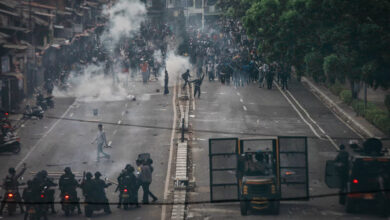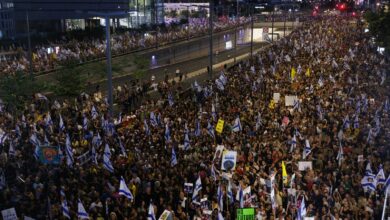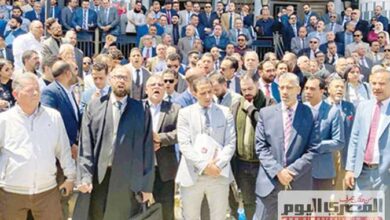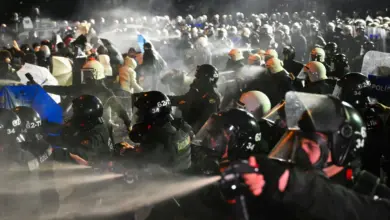Political and revolutionary forces are moving ahead with plans for a large-scale demonstration in Tahrir Square on Friday 9 September, despite concerns over over a statement on Wednesday from the Supreme Council for the Armed Forces (SCAF), which many feel contained veiled threats of a crackdown on demonstrators.
The planned protest, which is being organized under the slogan "Correcting the Path of the Revolution," seeks to pressure the SCAF into reversing some of the decisions and policies it has made since the January uprising, which many see as counter-revolutionary. The key groups participating in the protest include the Coalition of Revolutionary Youth, the Tagammu Party, the Ghad Party, the Union of Revolutionary Youth, the 6 April Movement, the National Democratic Front, the Adl Party, and all the major potential presidential candidates.
While those groups organizing the protest have emphasized its peaceful intentions, there is concern that secretive counter-revolutionary elements may be seeking to provoke violence in order to discredit the event, particularly through the use of false information spread through Facebook and other websites.
Among them is a Facebook page created the name of the Coalition of Revolutionary Youth, but which has been disowned by members of the group. The page contains rumors that demonstrators plan to march on the Ministry of the Interior, Ministry of Defense and the television building at Maspero, and potentially assault the three sites.
“We found this group on facebook spreading false rumors in our name," said Mohamed Abbas, a member of the Coalition of Revolutionary Youth. "We would like to make it clear that we are only calling for a peaceful demonstration in Tahrir on 9 September, which will end at 6pm.”
The SCAF issued a statement on Wednesday, saying, “The groups that are calling for 9/9 are responsible for maintaining the organization and security of the places that the demonstrations will take place in.”
Wednesday's statement by the SCAF was in part prompted by the rumors of marches on government buildings. In its statement, the military said that transgressions would be dealt with "sternly."
“I’m a bit concerned about the SCAF’s statements," said Abbas. "It feels like an unnecessary escalation of tension. Since we are going to be responsible for the organization and security of the demonstrations, then they [the security forces] should vacate Tahrir.”
Abbas considers the continued presence of Central Security Forces, as well as some Military Police, in Tahrir Square as an affront to the 25 January Revolution.
Groups participating in the protest on Friday have agreed on a set of demands, including: an end to military trials; a roadmap for the transition to a civilian government; and the revision of the new laws on electoral constituencies and parliamentary elections.
“There have already been some advances made on ending military trials and providing a roadmap for a civilian transition, but I doubt the demonstrations will be able to reverse the SCAF’s decisions regarding the election laws or re-zoning. They don’t change their mind that quickly,” said Political Analyst Moustafa Kamel al-Sayed.
Reports today suggest that the government is considering May 2012 as a date for presidential elections, providing a key marker on an otherwise vague roadmap for the transition to civilian power.
Most key political groups and parties have decided to take part in Friday's protests. However, some prominent groups have decided against participating, most notably the Muslim Brotherhood's Freedom and Justice Party, the Wafd Party and various Salafist parties.
“The goal of these million-man marches is to pressure the authorities into fulfilling the goals of the revolution, and it has already done so. Now, any such activity must have the agreement of all the groups so that it can be more effective,” said Mohamed al-Katatny, secretary general of the Freedom and Justice Party on the Muslim Brotherhood's website.
Al-Sayyed al-Badawi, the president of the Wafd Party, meanwhile, is quoted in news sources as saying, “Too many of these marches makes them less effective.”
The withdrawal of these two parties represents a continuation of their SCAF-friendly policies, and their general reluctance to participate in street demonstrations since the resignation of President Hosni Mubarak on 11 February. According to a report in Al-Shorouq newspaper, the Brotherhood decided to withdraw from the demonstrations only after a meeting with SCAF members earlier this week. They later issued a statement denying any such meeting took place.
However, their decision may also be linked to the fact that one of the main demands of the protests is a review of the new parliamentary elections laws, which were issued recently by the SCAF. “The larger constituencies greatly favor Islamist parties, and other established political groups. They have no interest in calling for a review of them,” said Sayed.
Sayed predicts a large turnout on Friday — though he says it will not be near the magic "million" figure often quoted in the media. While the protests may not force the military to amend election laws immediately, or those laws prohibiting demonstrations that directly harm productivity, it may still serve the purpose of maintaing pressure on the SCAF to heed revolutionary demands.
The protests on Friday also coincide with Farmer’s Day, an annual celebration on 9 September that has been given particular emphasis by the SCAF this year, perhaps partly in order to distract from protests in Tahrir Square. However, the head of the Farmer’s Union, Mohamed Abdelqader, said that they would be boycotting the celebrations this year, out of respect for those killed in the 25 January uprising. Instead, he said, the union would spend the day protesting against corruption at the Ministry of Agriculture.




